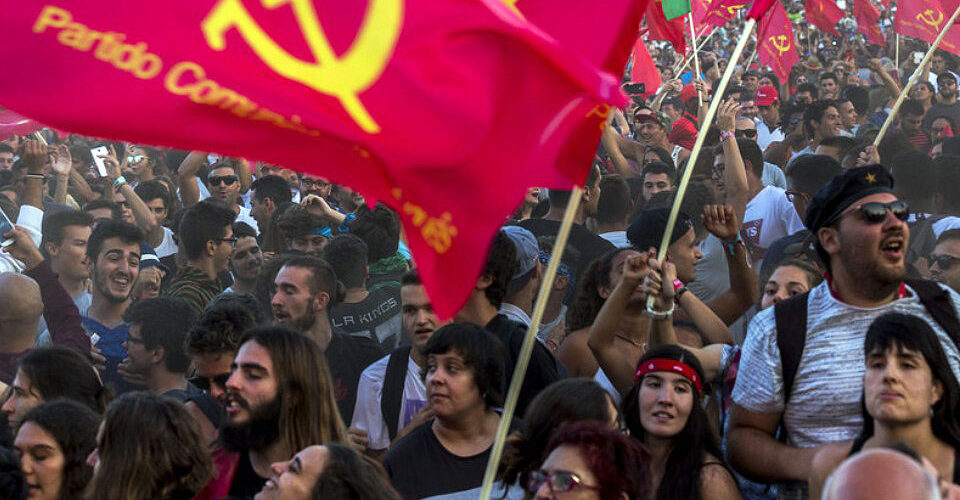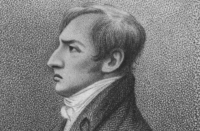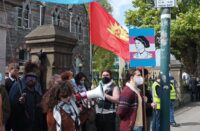Fifty years ago on April 25th, Portugal’s 41-year-old dictatorship, the oldest in Europe, was overthrown in just 24 hours with only four dead – all shot by the fascist secret police.
“The centre of Lisbon was awash with flowers and knots of jubilant groups on every street corner. Soldiers and sailors stood sentry in front of official buildings … nonchalant and relaxed, red carnations in their lapels or the barrels of their guns … They were continually embraced by the ordinary people, who showered them with flowers and kisses, drinks and food. I have never seen an army so at one with the people. One young conscript told us: “Yes, we now have a unity between the people and the armed forces, and we must make sure no-one destroys that.” (Green 2024)
That eye witness description of the immediate aftermath of Portugal’s “Carnation Revolution” captures both the joy of a new beginning and the fear of what might, and did, go on to undermine it. During the post war period Portugal under President Salazar was a byword for social and economic backwardness and political repression; with little or no change after 1968 under his successor Marcelo Caetano. Into the 1970s there continued to be a large peasantry in the North, sprawling landed estates worked on a seasonal basis by impoverished rural workers in the South as well as a growing number of poorly paid urban workers in local and foreign owned industry centred around Lisbon and along the coast in the Porto region. There were very high levels of emigration to other parts of Europe and to Portugal’s colonies.
The regime was determined to retain those lucrative colonies, especially in Africa, but were faced with growing armed resistance. As a founder member of NATO, the regime was able to call on American and European support in trying to hold back the tide of anti-colonialism. But it became increasingly clear that the costly, in money and bodies, colonial wars could not be won. The effect of this on the mainly conscript Portuguese armed forces was growing numbers of desertions and failure to report for enlistment. It also led to the setting up of the clandestine Armed Forces Movement (MFA) in 1973.
By April 1974 the MFA had a network of 200 supporters, mostly middle ranking officers, committed to overthrowing the dictatorship in favour of a modernisation, not socialist, programme for “Democracy, Development and Decolonialisation”. The signal for the revolution to begin was a radio broadcast of a popular song, “Grandola Vila Morena”. When the song was heard at midnight on the 24th April the MFA advanced on Lisbon not knowing what the response of the rest of the armed forces or the general population would be. Little military resistance was put up and the population were jubilant.
What could just have been a failed military coup quickly became a revolution as the masses stood by the military. Dates were set for colonial independence. A wave of nationalisations took place. Workers’ control was instituted in hundreds of concerns. Agrarian reform was advanced through land occupation and the setting up of co-operatives. There was a flowering of democratic politics from below with a proliferation of political parties on the left, in different alliances with elements in the armed forces and amongst the people. The largest and best organised was the Portuguese Communist
Party (PCP). Drawing on its many years of leading a multifaceted struggle against the dictatorship, the PCP used its organisational strength and experience to try and maintain the broad alliance between the MFA and the people in what was a rapidly changing and highly contested political, social and economic context.
Inevitably these developments prompted a counter revolutionary response. Three times in the first 12 months after April 24 there were attempted counter coups by elements in the armed forces. These all failed and only served to lurch politics further to the left. However what was to prove successful in undermining the revolutionary momentum, was the manoeuvrings of the Socialist Party (SP). It was set up in 1973 with the help of the German Social Democratic Party of Germany (SPD) and the backing of the European Community to counter the influence of the PCP and starting a process of reversing the gains of the revolution that continues to this day. During constitutional assembly elections in 1975, the SP ran an anti-communist campaign around which all the reactionary forces
could rally. With left unity in tatters, the MFA soon followed with its own internal splits.
A number of things are clear from any detailed account of the Portuguese Revolution (Fauvet 1978; MML 2024): the complexity of the national and regional specifics of the struggle; the central importance of the imperialist context; just how difficult it was to create and maintain popular unity with the left at its core; and the centrality to effective revolutionary change of the mobilisation and creativity of mass struggle. Any assessment also needs to recognise what had been won, but also what had failed to be achieved. As the PCP put it, those years were ones of “unfinished revolution”.






